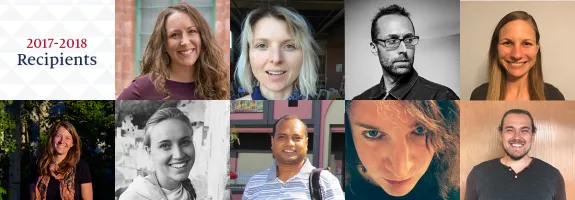
From left to right, top to bottom: Jenna Altherr Flores, Isan Brant, Conor Elliot Fitzgerald, Brittany Singletary, Arica Crootof, Sophia Borgias, Saleh Ahmed, Saffo Papantonopoulo and Joseph Dupris
This year's Graduate Fellows are combining creativity with academic rigor in their wide-ranging research activities. The projects span from tribal water rights and language preservation to environmental issues and transgender studies. Some of the projects examine questions regarding social disparities. We are proud to support such a great assortment of projects.
Voices from the Edge: Using Traditional Street Theatre to Promote Climate Awareness in Coastal Bangladesh
GIDP Arid Lands Resource Sciences student Saleh Ahmed is working to help connect rural populations, without access to mainstream media, to information on climate issues impacting the small community of Kalapara in Bangladesh's Patuakhali coastal district. Street theatre is a deeply cultural aspect of Kalapara, and Ahmed's goals are to utilize it to disseminate climate information and enhance disaster preparedness where a large share of the population face risks including sea level rise, salinity intrusion, coastal flooding and tropical cyclones.
Multimodality, Social Semiotics and Literacy: How LESLLA Learners from Refugee Backgrounds Make Meaning
Second Language Acquisition and Teaching student Jenna Altherr Flores is working to gain insight into how adult emergent readers from refugee backgrounds and non-Western cultures construct meaning from multimodal texts by focusing on still image, layout and writing. The results will be beneficial for multimodal assessment and pedagogical practices in learning environments, and for materials development and distribution by local and international institutions (e.g. resettlement agencies, USCIS, language and literacy programs) that work with this population.
Water, Law and Tribal Sovereignty: Paiute Perspectives on the Owens Valley Water Conflict
School of Geography and Development student Sophia Borgias is examining California's Owens Valley water conflict from the perspective of the Owens Valley Paiute tribes, whose history to reclaim water rights has been long-neglected. Drawing political ecology into conversation with legal geography, this project uses a critical interdisciplinary lens to challenge the oversimplified economic and environmental analyses that have dominated study of the Owens Valley water conflict and will use participatory methods in collaboration with the Owens Valley Indian Water Commission.
Eco-Grief: A Poem for No One
School of Art student Isan Brandt is creating a project combining visual art, poetry and ecology to explore the themes of drought and transformation through the geologic and human history of the Sonoran Desert's basin and range ecosystems. Merging artistic and scientific query, this project calls on divergent ways of understanding the complexity of our human position in the desert ecosystem. Human dependence on natural resources, such as fresh water for both survival and culture, is a central motif of the project.
Translating Science in a Digital Age: Digital Tools to Communicate Science for More Just Transitions to Renewable Energy
School of Geography and Development student Arica Crootof's project will explore how digital tools such as story maps and visual simulations can help illustrate research to more effectively communicate science to diverse audiences. Crootof's objectives are to incorporate the aforementioned digital tools to illustrate the spatial and temporal as well as social and physical dimensions of research, and to develop a blog that provides resources to make digital tools more accessible for academics.
waq dal naat maqlaqsyalank hema: Tribal-Centered Inquiry and Participatory Immersion for Klamath-Modoc Language Revitalization
Linguistics student Joseph Dupris's project is to develop and host a 5-day community-based language skills workshop and research inquiry intended to serve his tribe by articulating the stakes and expectations the Klamath tribal community prioritizes for the revitalization of maqlaqsyals (Klamath-Modoc language). This project is critical because children are no longer learning maqlaqsyalsas a first language. The workshop is a tribal-centered inquiry through participatory practice for successful maqlaqsyals revitalization.
Murmullos (murmurs or whispers)
Murmullos, Spanish for murmurs or whispers, is a photographic art project by MFA student Conor Elliott Fitzgerald that investigates violence in El Salvador. The project's aim is to engage audiences in an installation of large-scale photographs and an accompanying newsprint publication to engender dialogue around how current insecurity in El Salvador is part of a complex legacy of neocolonial violence. The country's civil war, in the 1980s-90s, was advised and financed by the U.S. government, and Fitzgerald will incorporate declassified U.S. governmental records on the war into this project.
Neither Here nor There: Transgender Sex Workers and the Politics of "East" and "West" in Thessaloniki
Anthropology and Middle Eastern Studies student Saffo Papantonopoulou explores the orientation of Thessaloniki, Greece as holding either an Eastern or Western identity. Greece's cultural and geographical location on the borders between "Europe" and the "Middle East" have become pressing political questions, with very real impacts on peoples' lives. Papantonopoulou will explore various sites that relate both to sexual politics, discourse, and the production of imagined geographies, in which the city belongs to either the "east" or the "west".
Who Cares? How Caregiving Influences Early Communicative, Cognitive and Physiological Development
Anthropology student Britt Singletary's project aims to improve understanding of how human allomaternal care (AMC--care from someone other than the mother) practices have evolved by investigating whether AMC influences signaling, cognitive and physiological outcomes; it will help determine whether AMC improves early developmental outcomes. The project will examine how children successfully communicate with known and unknown receivers within an experimental setting that requires them to solicit help in order to fulfill their desires.

